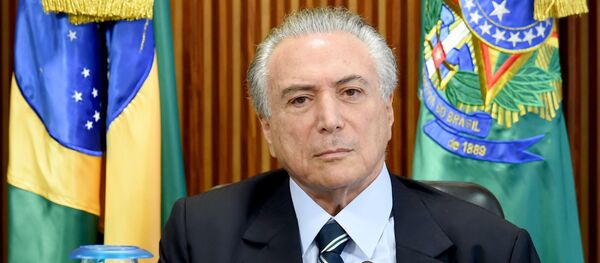The economic situation in the state of Rio de Janeiro leaves much to be desired. According to Tavares, it can be partially explained by high taxes which the state has to pay to the federal government every year.
"Rio's tax payments alone reach over 200 billion reals per year. And what do we get back? Only 10% of this amount," Tavares told Sputnik Brazil.
The Rio Olympics that were supposed to boost the infrastructure of the state's capital and help local businesses hasn't changed the economic situation for the better. Although the sporting event was supposed to be paid for mostly by private businesses, in the end, the state paid a major part of the amount to organize the competition.
Tavares noted that "Rio is my country" is a peaceful movement, which fights for the political independence of the State of Rio de Janeiro. It represents parts of the state's population and promotes the idea of Rio de Janeiro's secession "by legal and peaceful means."
"We are opposed to any armed conflict. We do not want a revolution, nothing like that. The only revolution that we stand up for is ideological revolution. We want to promote the idea of secession of the state of Rio de Janeiro. I believe that if the entire population of Rio de Janeiro will support its independence, no constitutional barrier will be able to stop us," the activist said.
However, Brazilian expert and professor of constitutional law at the Dom Cabral Foundation (Fundação Dom Cabral), Cláudio Pinho, said that independence movements that are gaining strength in Brazil are legal only as long as they are limited to debates and exchange of ideas.
"We can consider this issue from different angles. First, there is the freedom of ideas and freedom of association. Up to this point there are no problems, people have the right to gather freely and form associations in defense of the independence of a state," the expert said.
However, everything becomes more difficult when it comes to de facto independence and concrete steps in this direction.
"Any initiative of this kind should include proposals for the Constitution's amendments. And the 1988 Constitution prohibits procedures aimed at the destruction of the unity of the federation. So on the one hand it is possible, on the other it is impossible. We need to have a very cautious approach to these movements for independence, as some of them may hide segregation ideas, prejudices or racism. And these things are absolutely forbidden by the Constitution and Brazilian legislation. Ideological debate is guaranteed by law, but the law doesn't allow discrimination," Pinho stated.
Rousseff was removed from office this year, replaced by Michel Temer, a politician who was accused of orchestrating her impeachment and being involved in multiple corruption scandals. His appointment triggered protests across the country, during which activists opposed his presidency and demanded his resignation.






